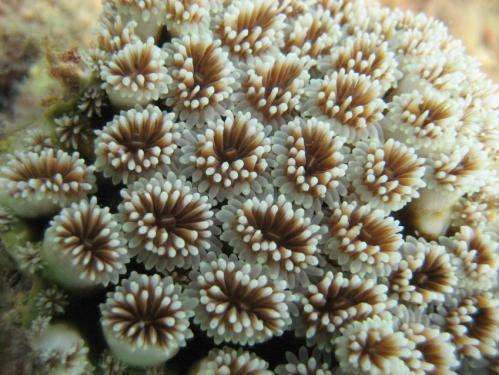Coral reef flattening leads to drastic decline in species

Species risk being lost if the ongoing degradation of coral reefs in the Caribbean goes beyond a certain critical point, scientists say.
In a study published today in the Journal of Animal Ecology, an international team of marine scientists led by Newcastle University has for the first time identified a threshold for the complexity of coral reef systems in the Caribbean below which the number of species declines.
A more complex reef structure should be able to sustain a more diverse community of species and bigger populations. However, bleaching, damage from hurricanes, changes in nutrients and the effects of fishing and other human activity have led to a degradation, or flattening, of coral structures.
Using a variety of habitat measures and looking at the full range of reef species, the research team showed similar trends in three widely-separated areas in the Caribbean: Bonaire, Puerto Rico and St Vincent & the Grenadines. They discovered that total species richness was greatest in areas where reef complexity was high, and declined considerably in reefs where structures had been degraded.
Although the importance of reef complexity for fishes is known, until now the extent to which flattening affects the total reef ecosystem at large scale has been scarcely known.
Nick Polunin, Professor of Marine Environmental Science at Newcastle University, said: "Complex coral reefs such as those in the Caribbean are among the most species-diverse habitats on the planet, and this research shows that the architecture of these systems plays a crucial role in maintaining all those species.
"These findings help us better understand the effect that changes in reef shape, height and complexity have had and are having on total species richness, when corals are not replaced naturally and the reef gets broken down by erosion.
"If reefs are degraded to the point where their complexity falls below a certain critical level, this could mean some species disappearing entirely from the Caribbean reef system, and substantial declines in all reef species, in particular corals and fishes. This will have a profound impact on the variety of species present and undermine the resilience of the entire Caribbean reef ecosystem, as well as threatening reef-based fisheries."
More information: "Reef flattening effects on total richness and species responses in the Caribbean." Journal of Animal Ecology. doi: 10.1111/1365-2656.12429
Journal information: Journal of Animal Ecology
Provided by Newcastle University
















